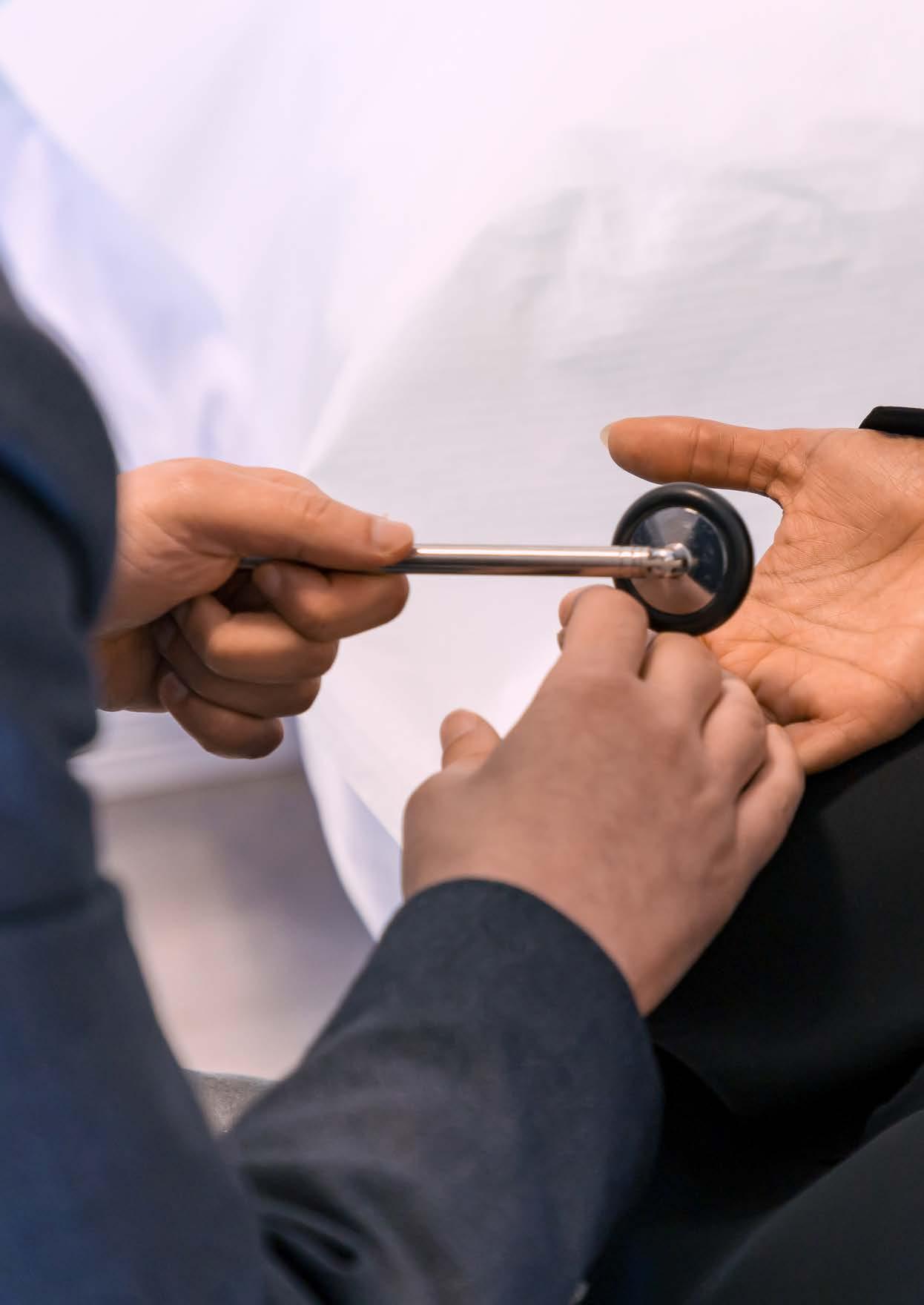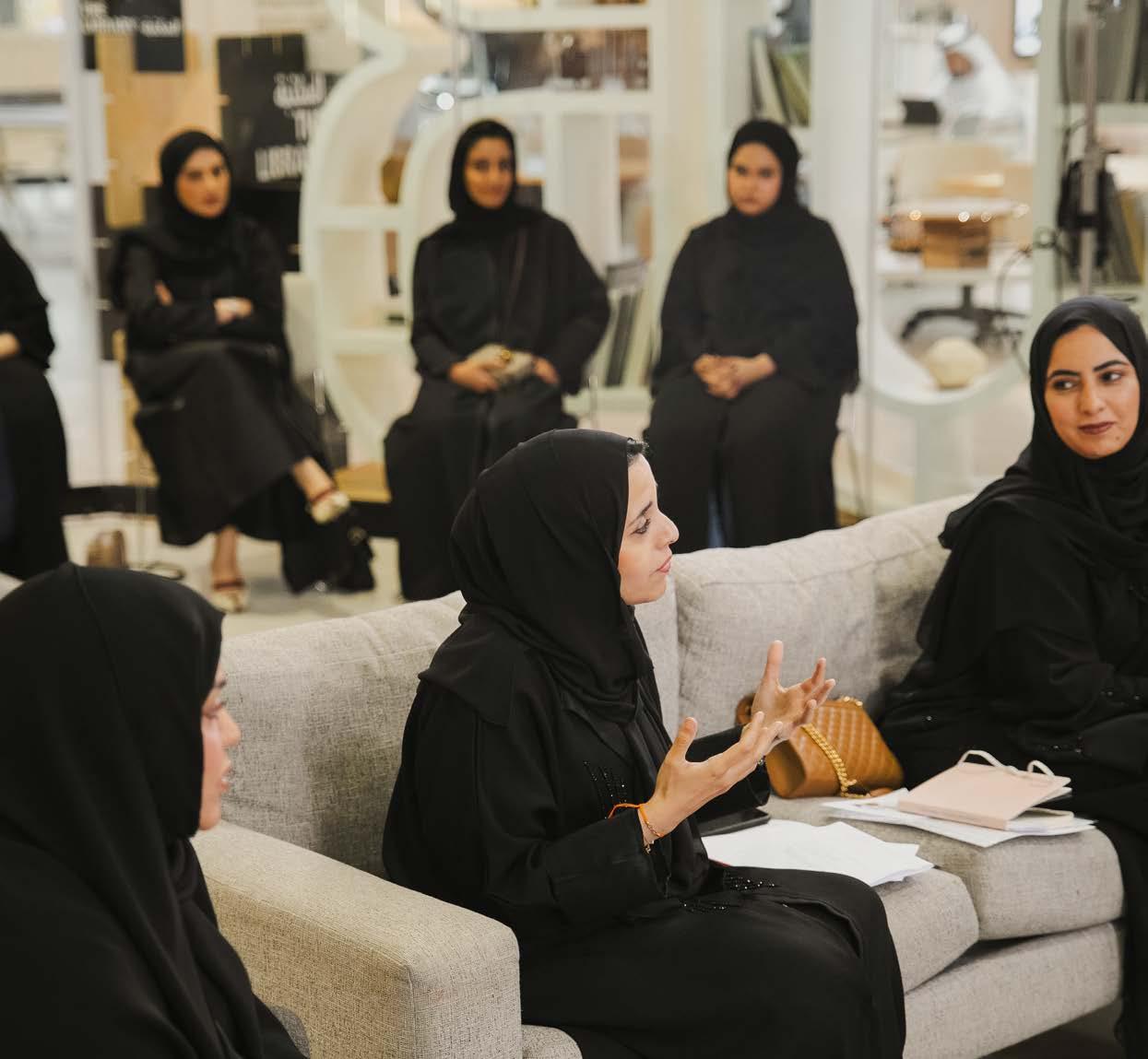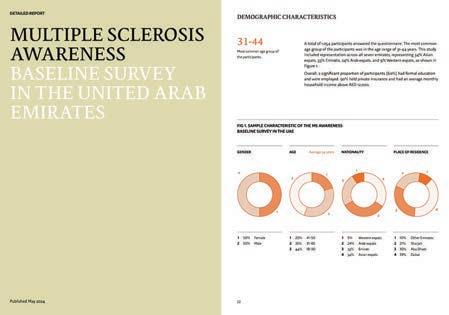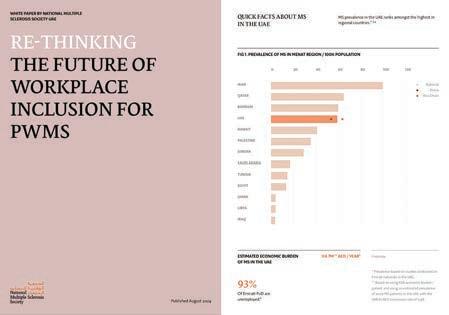RESEARCH IMPACT REPORT






The National Multiple Sclerosis Society (NMSS) which operates under the Ministry of Community Empowerment in the UAE, is dedicated to bettering the lives of people living with multiple sclerosis (MS) and their communities through education, advocacy and advancing global efforts to finding a cure for MS. NMSS strives to raise awareness of MS, establish a comprehensive support system for the MS community in the UAE and provide resources to those impacted by the condition.


NMSS continues to exemplify leadership in driving transformative research that aspires not only to alleviate suffering but to unlock lasting solutions for people living with multiple sclerosis.
Through strategic research investments and a strong commitment to collaboration across the UAE’s scientific community, NMSS is paving the way for breakthroughs that can redefine how we understand, manage, and ultimately overcome MS. This report reflects the powerful momentum built over the past two years — a testament to what can be achieved when vision, innovation, and dedication converge.
The UAE’s rapidly advancing research ecosystem, now growing at a pace three times the global average, is a fertile ground for pioneering solutions. As we move forward, we must continue to amplify these efforts, fostering partnerships that extend our impact beyond borders and bring renewed hope to patients and families worldwide.
I extend my deepest appreciation to all contributors — researchers, clinicians, institutions, and advocates — who are propelling this vital mission forward. Together, we are shaping a future where MS no longer limits lives, and where research continues to be a powerful force for healing and change.
Her Excellency Dr. Fatima Al Kaabi Vice Chair, National Multiple Sclerosis Society


At the heart of our mission lies a commitment to advancing innovative research that improves care, deepens understanding, and drives meaningful progress for people living with MS.
Through targeted funding, international collaborations, and transformative initiatives like research grants, registries, and fellowships, we are addressing immediate needs while building a foundation for long-term progress.
By supporting groundbreaking studies and fostering a stronger research workforce, we are paving the way for better treatments, enhanced health systems and improved quality of life for people with MS (PwMS). Every step we take brings us closer to transforming lives and finding answers that will shape the future of MS care.

Research is the cornerstone of our mission at the NMSS. Through rigorous research, we strive to uncover new treatments, improve patient care, and ultimately, find a cure for MS.
AED 2M+
Awarded & funded 5 studies in this inaugural cycle.
4M
Second grant cycle opened & funded 6 new research projects.
FUNDED TO DATE
6.5M
FUNDING COMMI ED TO 2026
9.4M
46
The 2024/25 research grant cycle yielded 46 accepted applications from Abu Dhabi, Dubai and Sharjah, which included 15 international and regional collaborators.
~4x
Growth compared to the previous year, showcases an exponential prioritisation of MS research, underscoring the UAE’s strengthened and unwavering commitment to advancing this field.
PRIMARY INVESTIGATOR
Prof. Yendry Ventura
STUDY DURATION
1.5 year
PROF. YENDRY VENTURA CEO of ADSCC
RESEARCH TITLE ABOUT THE RESEARCH
Randomised Controlled Open-Label Study Evaluating the Safety and E cacy of Extracorporeal Photopheresis (ECP) in the Treatment of MS
“In alignment with UAE’s visionary leadership, we are deeply commi ed to advancing research that drives meaningful progress in healthcare, particularly for conditions like MS. Our ongoing study on ECP as a treatment for MS underscores our pledge toward discovering new therapies for MS and improving patient outcomes.
Our strategic partnerships within the sector and the scientific community such as the NMSS enable us to continue driving innovation – ultimately working toward be er treatments for those living with MS.”
POTENTIAL CONTRIBUTION TO MS COMMUNITY
This research aims to investigate the safety and e cacy of ECP as an addon treatment for MS, building upon evidence from previous studies that suggest this therapy may o er e ectiveness. ECP is a leukapheresis-based immunotherapy in which the patient’s own white blood cells (leukocytes) are exposed to a photosensitizing medication and ultraviolet-A irradiation before being reinfused.
Results from this research could o er promising treatment options for both secondary progressive MS (SPMS) and relapsing-remitting MS (RRMS). This has the potential to significantly enhance symptom management and expand therapeutic choices for the MS community.
RESEARCH TITLE
A WORD FROM DR. BEATRICE BENEDE I
Neurological Institute, Cleveland Clinic Abu Dhabi
PRIMARY INVESTIGATOR
Dr. Beatrice Benedetti
STUDY DURATION
2 years
ABOUT THE RESEARCH
POTENTIAL CONTRIBUTION TO MS COMMUNITY
Addressing the Eligibility of Escalation Versus Early Intensive Approach in Treatment-Naïve Relapsing MS Patients Using MRI and Deep Learning
“The selection of disease modifying treatment in patients with MS has become increasingly complex due to the expanding therapeutic landscape. Our study aims to support this choice by developing an AI-based tool that predicts disease progression using MRI data.
By assisting neurologists in stratifying patients for treatment approaches, our tool has the potential to enhance personalised care and improve outcomes in MS management.”
The therapeutic scenario for relapsing MS has expanded dramatically over the last 20 years, making treatment decisions increasingly complex for clinicians. This study aims to develop and validate an AI-based tool for predicting disease progression in MS patients over a two year period using MRI data. The proposed tool will assist neurologists in stratifying patients for treatment approaches, between escalation and early intensive therapies.
The study design involves retrospective analysis of MS patients’ routine MRI data, categorizing them based on the received disease-modifying therapies. Advanced image analysis techniques will be employed to extract relevant features, and a novel AI solution will predict clinical and radiological disease activity. Statistical analyses will validate the tool’s performance and assess its robustness and sensitivity.
With MS treatment decisions becoming increasingly complex, this study seeks to contribute to personalised medicine in MS management by providing neurologists with valuable decision support, potentially improving patients’ outcomes.
RESEARCH TITLE
A WORD FROM DR. BASSEM YAMOUT
Neurology Institute and Multiple Sclerosis Centre, Harley Street Medical Centre, President of MENACTRIMS
PRIMARY INVESTIGATOR
Dr. Bassem Yamout
STUDY DURATION
1 year
ABOUT THE RESEARCH
POTENTIAL CONTRIBUTION TO MS COMMUNITY
MS in Children: Epidemiology, Clinical Characteristics, and Treatment Patterns in the MENA Region
“Our collaboration with NMSS has been instrumental in advancing our research on paediatric MS. We are deeply grateful for the grant provided by NMSS, which has been vital in supporting this critical research initiative.
The society’s commitment to elevating MS care in the UAE and the MENA region is helping us gather and analyse data that will shape the future of MS treatment, ultimately improving the lives of young patients across the region.”
Epidemiological studies of paediatric-onset multiple sclerosis (POMS) in the Middle East Noth Africa (MENA) region are lacking.
This research aims to assess the clinical characteristics, epidemiology, MRI features, and treatment patterns of POMS, defined as patients with disease onset below 18 years of age, in the MENA region by using data from the Middle East North Africa Committee for Treatment and Research in MS (MENACTRIMS) registry and other local databases.
This study is the largest of its kind in the UAE and the region.
Examining how age influences treatment response could be crucial for enhancing long-term outcomes among children a ected by the disease in the MENA region.
RESEARCH TITLE
A WORD FROM DR. MOHAMMAD YAQUB
Associate Professor of Computer Vision, Mohamed bin Zayed University of Artificial Intelligence
PRIMARY INVESTIGATOR
Dr. Mohammad Yaqub
STUDY DURATION
1 year
Prediction, Timely Diagnosis and Accurate Prognosis of Multiple Sclerosis from Multi-Modal Data Using Artificial Intelligence
“Through the generous funding from NMSS and the support from MBZUAI, the team is well equipped to tackle this problem and hopefully produce innovative solutions that could lead to transformative outcomes.”
ABOUT THE RESEARCH
POTENTIAL CONTRIBUTION TO MS COMMUNITY
This study aims to use advanced AI algorithms to analyse data from patients with MS, including brain MRI scans and patient’s clinical history to improve the detection, diagnosis and prognosis of MS. The preliminary results show a developed image-based classifier to di erentiate between normal and abnormal MRI scans using publicly available datasets of healthy individuals and MS patients.
This AI tool can accurately distinguish MS patients from normal by analysing brain MRI scans. The team also developed DEFUSE-MS: Deformation FieldEnhanced Spatiotemporal Graph-Based UNet for new T2-w lesion detection in multiple sclerosis, an automated method for detecting new lesions in MS patients using UNet spatiotemporal Graph Neural Network (GNN).
Ultimately, this study aims to utilise these AI algorithms to facilitate the early identification and prompt diagnosis of MS. This can potentially lead to commercial applications to improve patient outcomes.
RESEARCH TITLE
A WORD FROM DR. OSAMA
ABDULLAH
Research Instrumentation Scientist II, NYU Abu Dhabi
PRIMARY INVESTIGATOR
Dr. Osama Abdullah
STUDY DURATION
3 years
“The development of this tool will dramatically ease the process by a neuroradiologist of comparing lesions across different MRI scans, particularly when dealing with numerous lesions.”
POTENTIAL CONTRIBUTION TO MS COMMUNITY
This research developed state-of-the-art deep learning technologies to create an AI-based tool to train advanced neural networks using UAE-specific patient data from Cleveland Clinic Abu Dhabi (CCAD) and Yas Clinic (YC). This data has been leveraged to create a tool accessible to the broader medical community, enhancing MS care and research. The team has manually curated 150 patient datasets to date.
A milestone for this study has been the development of an online lesion segmentation system, designed to integrate directly with hospital Picture Archiving and Communication Systems (PACS) and streamline crosssectional lesion analysis. While the online tool is still undergoing refinement, its early adoption at CCAD illustrates its potential to boost clinical accuracy and streamline workflow in real-world hospital environments.
The LAMINATE study has created the LesionView App, an innovative so ware platform that streamlines the assessment of a large number of lesions through cluster analysis and center-of-gravity matching, enabling the tracking of each lesion’s evolution. The app allows physicians to focus specifically on new, disappearing, or enlarging lesions. The team aims to deploy LAMINATE as a commercial product, therefore, plans are taken into account to create a product with predefined roles, including (1) physician, (2) external users, (3) hospital administrators, and (4) site administrators. Each user will have relevant profiles to enable them to conduct their tasks smoothly.
RESEARCH TITLE
PRIMARY INVESTIGATOR
Dr. Halima Alnaqbi
STUDY DURATION
3 years
A WORD FROM DR. HALIMA ALNAQBI
Assistant Professor, Biomedical Engineering & Biotechnology, Khalifa University
“By uncovering the genetic and epigenetic familial factors behind multiple sclerosis in the UAE, this study brings us steps closer to personalised treatments—giving patients hope for be er care and improved quality of life.”
ABOUT THE RESEARCH
POTENTIAL CONTRIBUTION TO MS COMMUNITY
This project aims to investigate the genetic and epigenetic associations of familial MS (FMS) in the UAE population, focusing on identifying biomarkers related to susceptibility, clinical phenotypes, severity, and progression of MS. The study will focus on this understudied population by employing cuttingedge biomolecular and bioinformatic techniques. The study leverages data from the Emirati Genome Project.
The proposed study will benefit MS patients in the UAE and provide insights into other ethnically and genetically similar populations, such as those in the Arabian Peninsula. This study is poised to transform our understanding of MS by enabling the development of predictive models for disease risk, advancing pharmacogenetic therapies, and informing genetics-based prognostic tools.
RESEARCH TITLE
A WORD FROM DR. ALHAM JEHAD ALI AL-SHARMAN
Associate Professor, College of Health Sciences, University of Sharjah
ABOUT THE RESEARCH
POTENTIAL CONTRIBUTION TO MS COMMUNITY
PRIMARY INVESTIGATOR
Dr. Alham Jehad Ali Al-Sharman
STUDY DURATION 3 years
Development and Evaluation of Augmented Reality-Based Dual-Task Training to Enhance Cognitive and Motor Function in People with MS
“This research pioneers the use of Augmented Reality (AR) to revolutionise rehabilitation for people with multiple sclerosis. By integrating advanced cognitive-motor training, we aim to drive neuroplasticity, enhance mobility, and empower individuals with MS to reclaim their independence and quality of life.”
This study aims to develop and evaluate an Augmented Reality (AR) based dual-task training program to improve cognitive and motor functions in PwMS. The research will assess the feasibility, acceptability, and preliminary e cacy of AR scenarios designed for MS rehabilitation. Furthermore, this study seeks to understand the mechanisms underlying the intervention, with a particular focus on neuroplasticity and the roles of key factors such as Brain-Derived Neurotrophic Factor (BDNF) and serotonin.
This project aims to support people with Long Term Neurological Conditions (LTNC) with complex needs as per MS, to maintain mobility and cognitive function. It has the potential to reduce dependence on residential services and acute hospital care.
RESEARCH TITLE
A WORD FROM DR. CHARALAMPOS PITSALIDIS
Assistant Professor, Physics, Khalifa University
PRIMARY INVESTIGATOR
Dr. Charalampos Pitsalidis
STUDY DURATION 3 years
Self-Energy Harvesting Sensors for Enhanced Monitoring of MS (SENSE-MS)
“There is a clear need for the development of innovative and accessible technologies to improve gait monitoring and enhance patient care. TENG technology presents a promising solution to current technological limitations, and the SENSEMS project marks an important step toward unlocking its potential in the context of multiple sclerosis.
As the global prevalence of motion disorders continues to rise, advancements such as TENG-based gait sensors will play a critical role in enabling personalised, efficient, and effective healthcare solutions.”
ABOUT THE RESEARCH
The SENSE-MS project aims to develop a wearable, self-powered monitoring system using triboelectric nanogenerator (TENG) technology to continuously track gait abnormalities in MS patients. The study integrates these sensors into comfortable wearables which transmit data in real-time. By combining this with AI algorithms, the system can identify subtle changes in gait, facilitating early detection of disease progression. The study will be done in collaboration with the University of Cambridge and patients will be recruited at Harley Street Medical Centre.
POTENTIAL CONTRIBUTION TO MS COMMUNITY
The goal is to enhance MS management and open avenues for broader applications in monitoring other neurological conditions.
RESEARCH TITLE
Professor of Health Policy and Systems Research, Mohammed bin Rashid School of Government
PRIMARY INVESTIGATOR
Prof. Immanuel Moonesar
STUDY DURATION
1 year
ABOUT THE RESEARCH
POTENTIAL CONTRIBUTION TO MS COMMUNITY
Assessing Geographic and Socioeconomic Disparities in Access to Disease-Modifying Therapies for Multiple Sclerosis Patients in the United Arab Emirates
“Our research on geographic and socioeconomic disparities in multiple sclerosis treatment access represents a critical intersection of health policy, spatial analysis, and social equity. By mapping treatment availability across the UAE and identifying access barriers, we are not just collecting data – we are creating a framework for healthcare accessibility that can revolutionise resource allocation for MS and other chronic conditions. This work embodies my commitment to evidence-based policy that addresses healthcare inequities through innovative methodological approaches and multidisciplinary collaboration.”
This study aims to evaluate the di erences in access to DMTs across the UAE. It focuses on mapping the availability of these therapies, analysing the impact of socioeconomic factors such as income, education, and health insurance, and identifying disparities between urban and rural areas. The study also examines how distance to treatment centres a ects therapy initiation and adherence.
By addressing the spatial and socioeconomic dimensions of DMT accessibility, this research can significantly improve the standard of care for MS patients in the UAE, ultimately enhancing their quality of life and longterm health outcomes. The methodologies and insights developed in this study may also serve as a model for similar analyses in other countries in the region and beyond.
RESEARCH TITLE
A WORD FROM DR. MOHAMMAD YAQUB
Associate Professor of Computer Vision, Mohamed bin Zayed University of Artificial Intelligence
PRIMARY INVESTIGATOR
Dr. Mohammad Yaqub
STUDY DURATION
1 year
ABOUT THE RESEARCH
POTENTIAL CONTRIBUTION TO MS COMMUNITY
NMSS-LLM: The World’s First Large Language Model for Multiple Sclerosis
“The NMSS-LLM project aims to develop the world’s first Large Language Model designed specifically for Multiple Sclerosis (MS). Led by MBZUAI, it will consolidate MSrelated data into a bilingual platform, using advanced AI to support understanding, diagnosis, and research.
The project is expected to improve clinical decision-making, accelerate MS research, and foster a collaborative ecosystem for knowledge sharing, offering a significant innovation in AI-driven healthcare for complex neurological conditions.”
The NMSS-LLM project aims to develop the world’s first Large Language Model (LLM) specifically designed for MS. This AI initiative will use advanced natural language processing (NLP) to create a centralised, bilingual platform for consolidating and analysing MS-related knowledge. By integrating fragmented data from diverse sources, NMSS-LLM will provide clinicians, researchers, and patients with a powerful tool to enhance understanding, support diagnosis, and personalise treatment. Expected outcomes include improved clinical decision-making, accelerated MS research, and a collaborative ecosystem for knowledge sharing, marking a significant innovation in AI-driven healthcare solutions for complex neurological conditions like MS.
The development of a specialised LLM for MS holds the potential to revolutionise research and patient care by o ering insights into disease patterns, improving diagnostic accuracy, and facilitating personalised treatment strategies.
RESEARCH TITLE
PRIMARY INVESTIGATOR
Dr. Shadi Hasan
STUDY DURATION
3 years
Enhancing Myelination in Multiple Sclerosis Through Targeted Electric Field Stimulation
A WORD FROM DR. SHADI HASAN
Director at the Center for Membranes and Advanced Water Technology & Associate Professor of Chemical Engineering at Khalifa University
“This study explores the potential of targeted electric field stimulation (EFS) to enhance remyelination in multiple sclerosis patients. By leveraging in vitro and in vivo models, the research aims to identify optimal EFS parameters, understand cellular mechanisms of oligodendrocyte precursor cell differentiation, and assess functional outcomes; paving the way for a novel, non-invasive therapeutic strategy to improve neural repair and quality of life for MS patients.”
ABOUT THE RESEARCH
POTENTIAL CONTRIBUTION TO MS COMMUNITY
This study investigates the potential of electric field stimulation (EFS) to enhance remyelination in MS patients. The project has both in vitro and in vivo phases, wants to determine the optimal EFS parameters and understand the cellular mechanisms influencing oligodendrocyte precursor cell (OPC) di erentiation and myelin synthesis. The study aims to assess functional outcomes through animal models, with the aim of developing a non-invasive therapeutic approach to improve neural repair and quality of life for MS patients.
The development of a novel therapeutic modality that complements existing immunomodulatory treatments to o er a non-pharmacological and noninvasive approach with potentially fewer side e ects. The study also aims to improve functional outcomes and quality of life for MS patients by restoring neural conduction and preventing further neurodegeneration.

PROJECT TITLE
PRIMARY INVESTIGATOR
Dr. Anu Jacob
PROJECT COLLABORATION
3 years
ABOUT THE PROJECT
POTENTIAL CONTRIBUTION TO MS COMMUNITY
Dr. Anu Jacob and his team aim to comprehensively examine the landscape of MS within the UAE by examining the prevalence and incidence rates of MS, by investigating clinical characteristics and disease progression, and identifying any regional variations in its epidemiology. The study also assesses current treatments utilised for MS in the UAE and explores potential risk factors, including familial predispositions.
This fundamental work is expected to shed light on the prevalence of MS and its impact on people’s health in the UAE, o ering insights with global relevance. The data is expected to aid in healthcare planning, inform preventive strategies, and improve patient management, and enhance the understanding of regional variations to support tailored healthcare policies.
RESEARCH TITLE ABOUT THE RESEARCH
POTENTIAL CONTRIBUTION TO MS COMMUNITY
PRIMARY INVESTIGATOR
Dr. Theodore Jardetzky
STUDY DURATION
3 years
This study focuses on developing vaccines and therapeutic approaches targeting Epstein-Barr virus (EBV) entry glycoproteins. EBV infects a large portion of the human population and is linked to MS. This team aims to create a stabilised prefusion glycoprotein B (gB) as a vaccine antigen and identify neutralizing antibodies against EBV glycoproteins (gB and gHgL). These e orts could lead to e ective prevention and treatment strategies for EBV-related diseases, benefiting a broad range of individuals globally whilst addressing the STOP pathway of the MS cures roadmap.
This study aims to develop novel vaccine and antiviral approaches, which are considered e ective preventive and therapeutic options, specifically targeting EBV in the context of MS. It also provides insights into the roles of key glycoproteins in EBV entry, which are essential for understanding how to block the virus e ectively and for the development of targeted therapies.


Building local capacity and fostering specialisation in MS care and research are central to NMSS’ mission. This year, NMSS advanced opportunities for professionals to engage in specialised training and research, empowering them to enhance the lives of PwMS in the UAE.


NMSS aims to fund a postdoctoral research fellowship for a UAE national through the MENACTRIMS Fellowship Program, supporting the development of MS-specific research expertise. The call to recruit eligible candidates has been opened. This initiative encourages greater engagement in innovative studies addressing regional and global MS challenges.
Through this program, NMSS is creating a pathway for healthcare professionals to specialise in MS research, treatment, and care, contributing to capacity building and fostering innovation in the UAE’s MS ecosystem.


Our advocacy work is a steadfast commitment to advancing equity, access, and inclusion for people living with MS.
Through strategic initiatives, evidence-based publications, and stakeholder engagement, we aim to inform policy, shift mindsets, and drive systemslevel change.

Our research-based advocacy outputs aim to shape national conversations around stigma, employment, and patient-centred care.
These efforts reflect our belief that advocacy grounded in data and driven by the MS community is essential for transforming lived experiences today and building a more supportive future for all people with MS.
MS AWARENESS BASELINE REPORT
SCAN QR CODE TO READ PUBLICATION
A report has been published on the baseline awareness of MS, its symptoms and manifestations within the general population across the UAE. The report highlighted that 70% of people in the country had either limited or no knowledge of MS.

SCAN QR CODE
This report examined the challenges and opportunities in creating accessible work environments for PwMS in the UAE. It identified key employment barriers like stigma, inadequate accommodations, and inflexible policies. The report provides actionable solutions for policymakers, employers, and healthcare stakeholders, o ering a roadmap to create thriving, inclusive workplaces for individuals with MS.
SCAN QR CODE


The MS Treatment guidelines, which have been adopted by the Department of Health-Abu Dhabi and Dubai Health Authority’s EJADAH program, serve asserve as a health policy tool to standardize care, guide reimbursement, and align insurance coverage with best practices — reducing delays, ensuring consistency, and expanding equitable access. They support evidence-based, outcome-focused policies that prioritize patient access to treatment.

A WORD FROM DR. BOBY VARKEY
MARAMATTOM
Neurology Specialist, Apollo Adlux Hospital in Cochin Kerala, India
As a clinical neurologist treating patients in Kerala, South India, I found these guidelines extremely helpful. They have transformed the practice and treatment of MS and made it possible for neurologists of every ilk to optimise the treatment of MS for their own patients.
Only a few patients with highly active MS now need to be referred to higher centers. This has brought immense benefits to patients as they save on travel costs and treatment costs.
A WORD FROM PROF. ALASDAIR COLES
Deputy Head of Department for Clinical Neuroscience Cambridge University, UK
The UAE guidelines for the treatment of MS are rational and evidence based. Admirably, their focus is entirely on optimising long-term outcomes for people with MS.
FOLLOW US
For more information about MS and NMSS, please visit www.nationalmssociety.ae.
Visit the NMSS o cial social media platforms for the most recent updates and insights.
NMSSocietyUAE
National MS Society UAE
National Multiple Sclerosis Society UAE
NMSSocietyUAE
NMSSocietyUAE


